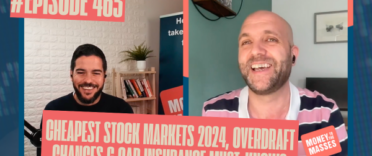The 126th episode of my weekly YouTube show where I discuss what is happening in investment markets and what to look out for. This week I talk about the latest interest rate decision in the UK, how that has impacted markets and how key central banks have surprised markets.
Each show lasts between 5-10 minutes and is aimed at DIY investors (including novices) seeking contemporary analysis to help them understand how investment markets work.
Subscribe to my YouTube channel to receive my weekly analysis of investment markets or alternatively, you can listen via my weekly Midweek Markets podcast below.
Midweek Markets weekly podcast
Other ways to watch, listen and subscribe
You can listen to other episodes and subscribe to the show by searching 'Money to the Masses' on Spotify or by using the following links:
Abridged transcript - Midweek Markets episode 126
In the last episode of Damien’s Midweek Markets, I wrote about the optimism in markets ahead of a number of key events, with US equity markets aiming for new all-time highs.
Much of the optimism was stemming from the unfolding earnings season, which continues to suggest that higher inflation pressures shouldn’t necessarily hurt corporate earnings. One of the potential hurdles since the last show was the earnings reports from a host of US tech giants including Facebook (now called Meta), Apple, Alphabet and Microsoft. Last time I asked the question, of whether we would see the tech-heavy Nasdaq 100 push to a new-all time, as a result of the impending earnings reports, which at the time sat only 1.5% shy of its then record.
To give you a sense of the strength of some of the tech giants’ earnings, Alphabet exceeded analysts’ expectations with $53.62bn in revenue (vs the $52.62bn expected) and Microsoft similarly posted $45.32bn (vs the projected $43.97bn).
It means that US equities were no longer just aiming for all-time highs, they were once again setting them. In fact last night we saw the 62nd and 39th all-time closing highs for the S&P 500 and the NASDAQ in 2021.
This side of the pond, the FTSE 100 has sustained a month-long upward trajectory on the back of better-than-expected economic growth projections from the Office for Budget Responsibility. The agency reassessed its growth forecast for 2022, now stating it expects the UK economy to return to pre-Covid levels by the New Year, rather than initial projections for March. It meant that the FTSE 100 broke above 7300 for the first time since February 2020 when the pandemic hit.
In slight contrast, European equities have been digesting disappointing earnings results, from major players like Shell, Airbus and Volkswagen which caused the pan-European STOXX 600 to lag its US and UK peers towards the end of October.
But fast forward to this week and the sole focus has been on the key central banks and whether they would raise interest rates and taper their QE programmes. The market expectation had been hawkish, or perhaps it could be more accurately described as ‘fearing the worst but hoping for the best’. By the start of this week we already had heard that the European Central Bank (ECB) would keep interest rates unchanged despite ongoing threats from inflation, with President Christine Lagarde further dampening expectations of a rate hike in the coming year.
Then on Wednesday, the US Federal Reserve announced that interest rates would also remain unchanged for some time but it would begin tapering its pandemic-emergency QE programme by $120bn-a-month. It meant that traders' bets of when US interest rates would rise were pushed into the future, after what was deemed a more dovish-than-expected policy meeting.
This was enough to push US S&P 500 and NASDAQ 100 to new record highs along with the European STOXX 60. And moments before recording this show the Bank of England announced that the MPC had voted 7-2 to keep rates on hold at 0.1%, defying market expectations for a hike. The bank also left its QE target unchanged. Bank of England Governor Andrew Bailey was among those opting to keep monetary policy unchanged. The pound has tumbled more than 1% against the dollar on the news.
Heading into this week’s central bank meetings the market was concerned that the ECB, the US Federal Reserve and the BOE would make policy mistakes by tightening too soon, in fear of rising inflation but ultimately snuffing out the post-pandemic economic recovery. But right now markets have been caught wrong footed, with their hawkish predictions being met with more dovish announcements from the three key central banks.
Now the market is concerned about each central bank’s credibility in not only managing the balancing act of inflation and economic growth but also in communicating its intentions. While the decisions have at least initially (it’s been only hours since the Fed and the BOE have announced their decisions) been positive for equity markets, they have slightly pulled the rug from under bond markets, especially in the UK, where gilt yields fell more than 7% (back below a yield of 1%) in a matter of minutes. The 10 years US treasury yield is also back at 1.56%, having risen as high as 1.67% two weeks ago when I last recorded an episode of Damien’s Midweek Markets.
It means that equity markets continue to be taking a half-full view of the economic and investing backdrop, rather than a half-empty one. And their resilience has been tested in the last week. But the wild moves in bond markets mean that that gap between the volatility in equities and bonds is widening at its fastest pace in a decade, with some analysts citing this as evidence of how complacent equity markets are about the risks posed by central banks that are beginning to tighten monetary policy. If that is the case then it would mean that a day of reckoning will hit equity markets at some point.
But right now investors continue to buy the dip especially at the start of November, which also marks the start of the best six-month period of the calendar year for stock markets. 80-20 Investor will shortly be receiving a research piece discussing how to take advantage of this phenomenon.



